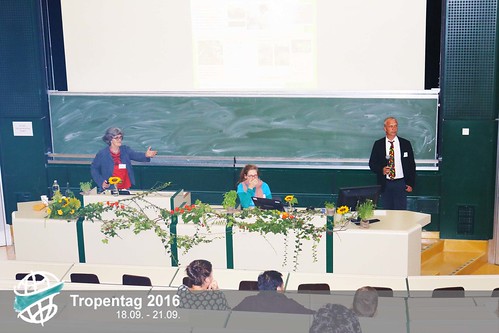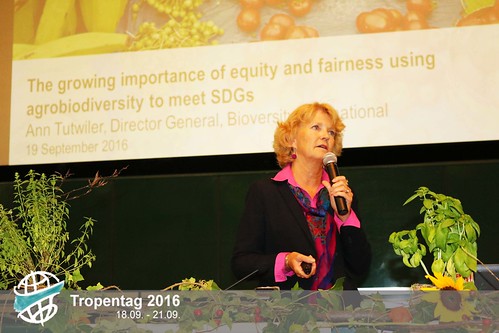Tropentag 2016
Crop Diversity Poster Session - Amaranth for the Win
Mon, 09/19/2016 - 19:45 — ElsbyThe first round of poster presentations took place this evening, with “Crop Diversity and Plant Breeding” showcasing its inaugural topics. Many the research projects of the session, including a handful of Master’s degree theses, such as an Andean tuber crop that can be used to treat diabetes; the amaranth plant which has religious Mayan significance; and sage genetic diversity, known for its seed oil uses.
One poster which stood out to me was the “unconventional vegetable” amaranth, presented by Roland Schafleitner. This plant can be used as both a grain and vegetable product, although it is highly perishable as the latter. This plant is popular in Africa and Asia, but no breeding research is currently being undertaken. It presents an opportunity for crop breeding and innovation, as well as collaboration between project cooperators (which the presenter is actively searching for!). It is an especially good research subject for genetic diversity as it is a C4 plant (resistant to heat and drought), and can produce new generations (and seeds) relatively quickly.
Biochar and Thirsty Goats
Mon, 09/19/2016 - 19:45 — BackhausI don’t know if everyone would agree with me that poster sessions are very entertaining. The first one on Monday about soil fertility and nutrient management (1.2) was actually quite insightful (supposing one has some interest in fertilisers made from waste and fecal sludge or manure from thirsty goats, which sounds meaner than it is – or isn’t it?).
The main topic of this session was biochar: Just put biochar on maize and see what happens. Irrigate your crop with wastewater or add biochar and, again, see what happens. Filter your wastewater with biochar, put the biochar on your crop and, oh yes, see what happens.
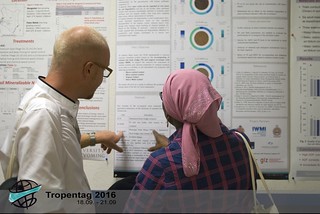
These research topics were indeed highly interesting, and I would invite you to go see the posters yourself and get your own impression. You will also find more information about conservation agriculture practices in Kenya and how to grow Cassava in the D.R. Congo.
By the way, there will be another poster session about this subject tomorrow morning, and the oral presentations at 11:30 am. It’s certainly worth a look!
Guided Poster section 3.1
Mon, 09/19/2016 - 19:26 — PoscherIn a very short X minutes wrap up, a big diversity and good mix of presentations and topics from all over the world were presented.
7 Posters from latin America, 4 Posters from Asia and 3 from Africa were displaied. They included topics of Forest Establishment, Agroforestry, Fodder, Policies, Community Forestry, Livelihood Enhancement and Landscape Restoration.
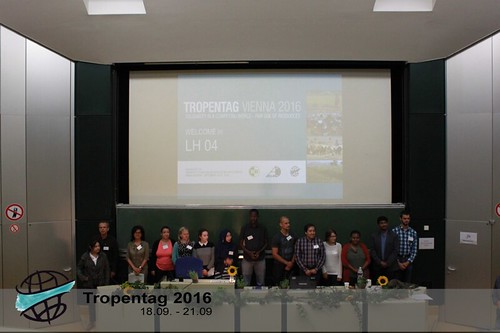 Even though the short time didn't allow to dive deeper into the topics, the presentations have definitely given hope to see the next generation of researchers growing up, continuing the strive to gain knowledge and foster improvement.
Even though the short time didn't allow to dive deeper into the topics, the presentations have definitely given hope to see the next generation of researchers growing up, continuing the strive to gain knowledge and foster improvement.
For an overview of the presenters with all the related poster just have a look at https://www.flickr.com/photos/tropentag/albums/72157672957864691/with/29...
First Words from Tropentag 2016 Keynote Speakers
Mon, 09/19/2016 - 19:00 — Elsby“Population is rising, and we must therefore produce more.” – Michael Hauser, this year’s keynote session moderator.
Tropentag 2016 kicks off with keynote speeches from three prestigious experts in the world of food security and science. These speakers set the tone for the conference and give the first insights into this year’s topic: solidarity in a competing world – fair use of resources. This is an exciting opportunity to hear words from experts and scientific contributors from around the globe, including Italy (and the United States), Thailand, and Nepal!
YPARD workshop Mission 2026: Acting now to support youth in agriculture
Mon, 09/19/2016 - 16:43 — KootloleFestive opening session at the Audimax
Mon, 09/19/2016 - 16:08 — BackhausToday at 12:30 pm the Tropentag 2016 has been officially opened in the Audimax by Bernhard Freyer, director of the Division of Organic Farming at BOKU University. Let's recall together, in order of appearance of the speechmakers, what has been said.
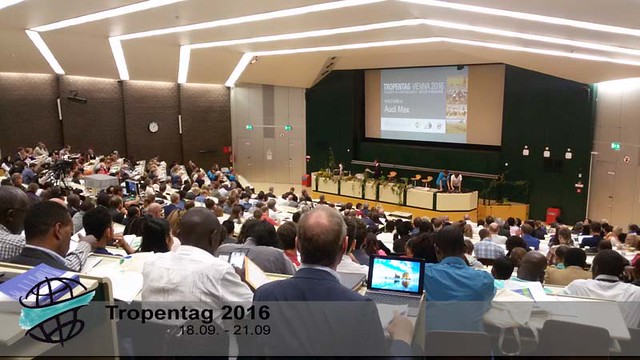
Joseph Glössl, Vice Chancellor for Research, welcomed the keynote speakers and introduced BOKU University emphasizing the role of its Centre for Development Research.
Robert Zeiner, head of Programmes and Projects International (ADA), appealed to all countries and stakeholders to act, and in general to support fair and sustainable production and resource management as well as to strengthen vulnerable groups. He stressed the importance of sustainable land use and local land management in assuring food security and avoiding resource related conflicts. Also, he underlined that equal access for smallholder farms is necessary.
Gerardo Patacconi, Officer-in-Charge at BOKU, then stressed the importance of sustainability and fairness in development work which could only be achieved by working together.
2016 student reporters: here they are!
Mon, 09/19/2016 - 15:32 — LangSince 2010, the team of Student Reporters has been sponsored by the initiated institution ATSAF e.V. that takes care of drawing the 12 team members from many different European Universities. They come from all around the world: Europe, Africa, North and South America, Asia! The team is in charge of spreading the conference material online in form of articles on a multi-author blog platform and Twitter, Facebook, Flickr, and YouTube, by so doing facilitating the communication within the scientific community and expanding Tropentag’s many voices. Let’s check their introduction video out!
Grazing Game; Playful Way to Playing Climate Change
Mon, 09/19/2016 - 14:46 — FadliLearning of climate change now comes to a new method. Thanks to Grace Villamor and her team for Grazing Game. This game design as a tool to study the behavior of farmers is meant to respond to climate variability adaptation. Grazing Game comes in Board Game and Online Game. Villamor conducted trials in Benin and Ghana. “We do this also in order to avoid bias from farmers. Often, when we interview them, they tend to give exactly the answer we want to hear,” said the ZEF researcher. Participatory games like Grazing Game seem to be a solution against such bias.
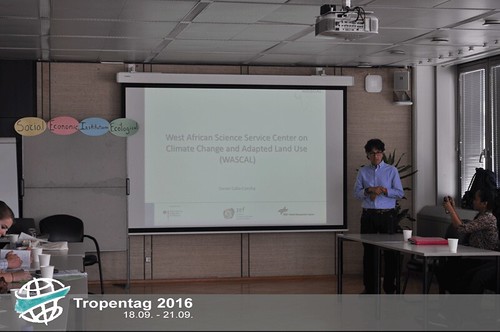
Ghana and Benin have been selected as trial countries because of their geographical location, at west Africa. And, as predicted, West Africa will have the most extreme climate change. Farmers, as actors, need to respond and take decisions on environmental conditions such us fluctuation of rainfall. Their response has reflected in the board game.
Men and Women Respond Differently





